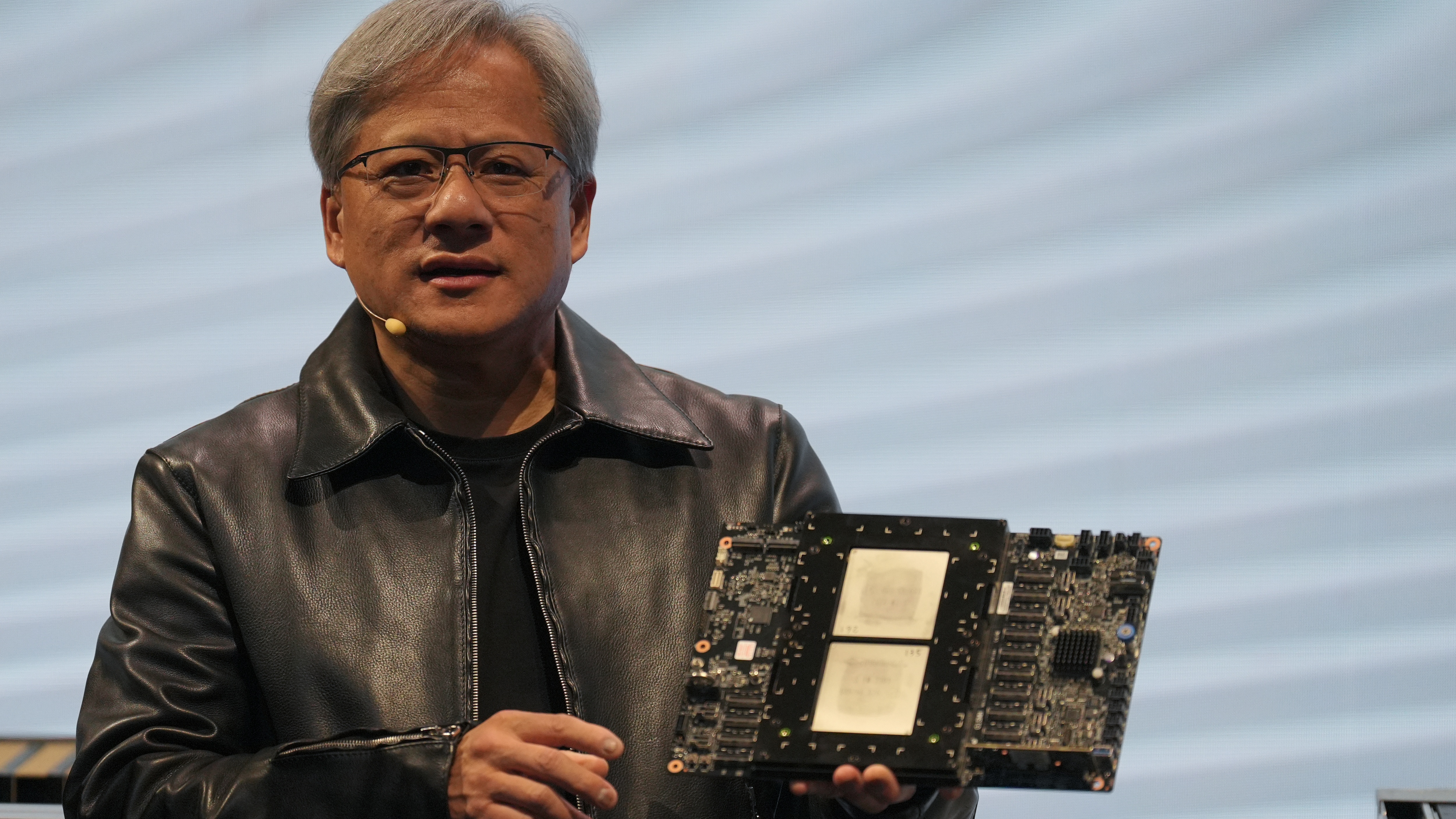Thanks to billionaires and businesses going mad for AI, Nvidia's market cap rockets past $3 trillion, pushing Apple into third place
Microsoft is fractionally ahead and you guessed it—that's all down to AI, too.

Ten years ago, Nvidia was a successful graphics card company, with a pretty impressive market capitalisation of $10 billion. Now, thanks to huge revenue and profits, all driven by the tech world's desire to have everything and everyone infused with AI, Nvidia's share prices have reached such a point that its market cap is now an astonishing three trillion dollars—higher than Apple, Google, and Amazon.
Only Microsoft has a larger market cap, though the margins between it, Nvidia, and Apple are all very narrow. Well, if one can call tens of billions of dollars 'narrow.' For those unfamiliar with the term market capitalisation, it's a relative measure of how valuable a company is on stock markets, with the figure determined by a simple multiplication of the number of company shares by the current share price.
At the time of writing, Microsoft's shares sell for around $420, whereas Apple's are roughly half that figure. Nvidia, though, is deemed so valuable right now that buying just one of its shares will set you back over $1,200. That's almost enough to buy its best graphics card, the GeForce RTX 4090, though you'll still be short by $400 or so.
And it's all down to the fact that tech companies can't get enough of Nvidia's superchips, such as the Hopper H100 and the recently launched Blackwell range. These are monstrously huge and expensive processors (or in some cases, multiple processors) designed to handle the billions of calculations required for AI training and inference.
No retail prices exist for these products, as such, but you're looking at figures 20 times that of an RTX 4090 and companies like Meta, OpenAI, and X are buying hundreds of thousands of them. This is why revenues for Nvidia's data centre division have skyrocketed, with $22.5 billion being generated in the last three months—ten times that of its gaming division.
It's not just about revenue, though, as AMD will tell you. It took over $5.5 billion in revenue in the first quarter of this year but only saw a net income of $1 billion. For the same period, Nvidia's net income was a little under $15 billion from a revenue of $26 billion. It's not hard to see why its share prices have climbed so rapidly.
Profits alone aren't the only reason why Nvidia is now deemed the second most valuable company in the world. It's also about the fact that, at the moment, no other business can produce as many AI megachips as Nvidia, with the complete software stack and performance demanded by its customers. TSMC, the chip manufacturer that's contracted to fabricate all of Nvidia's Hopper and Blackwell processors, simply can't make enough of them to meet demand, either.
Keep up to date with the most important stories and the best deals, as picked by the PC Gamer team.
That demand shows no sign of tailing off any time soon, even though AMD and Intel are pushing ahead with humongous chips of their own. Amazon and Google make AI processors for their own needs, but OpenAI, Microsoft, Meta, Tesla, and X don't. And they're all knocking at Nvidia's doors for its products.

Best CPU for gaming: The top chips from Intel and AMD.
Best gaming motherboard: The right boards.
Best graphics card: Your perfect pixel-pusher awaits.
Best SSD for gaming: Get into the game ahead of the rest.
Right now, Microsoft has the highest market cap of any company—$3.15 trillion—thanks to a combination of massive earnings ($62 billion in revenue, $22 billion net income, in the last quarter) and because it's throwing everything it can at AI. From Copilot+ PCs to privacy-concerning Recall, Microsoft wants AI to be a key part of every bit of software it churns out.
And as we've seen at Computex 2024, the majority of ancillary tech firms and hardware vendors are hot on Microsoft's tails, plastering AI onto motherboards, graphics cards, SSDs, and even power supply units, despite almost none of them actually using AI. That's not to dismiss the use of machine learning, as it has some clear applications and benefits in gaming, but no PSU is ever going to work better because of a neural network.
Artificial intelligence might not be making much of a difference to your life at the moment but for Nvidia, it's the road to becoming the most valuable company in the world.

Nick, gaming, and computers all first met in the early 1980s. After leaving university, he became a physics and IT teacher and started writing about tech in the late 1990s. That resulted in him working with MadOnion to write the help files for 3DMark and PCMark. After a short stint working at Beyond3D.com, Nick joined Futuremark (MadOnion rebranded) full-time, as editor-in-chief for its PC gaming section, YouGamers. After the site shutdown, he became an engineering and computing lecturer for many years, but missed the writing bug. Cue four years at TechSpot.com covering everything and anything to do with tech and PCs. He freely admits to being far too obsessed with GPUs and open-world grindy RPGs, but who isn't these days?

